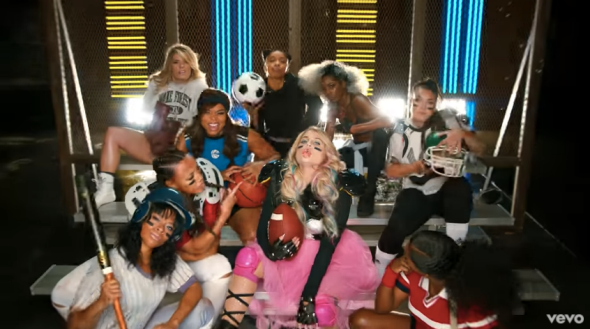Meghan Trainor seems to have been dreamed up by the same man-executives who greenlit those pink Bic “for her” pens that caused a mini–Internet earthquake a few years back. It’s clear that she is formulated to appeal to women, maybe even make them feel like she’s just “for” them, not “for” men. But Trainor’s narrow aesthetics of womanhood are so reductive, they advance contemporary feminism about as much as a disposable writing tool that’s pink instead of black.
Trainor’s latest release, the bluntly-titled “I’m a Lady,” finds Trainor dressing up in several traditionally masculine outfits (a button-up shirt, a tie, football pads), but with obvious feminine accents (rhinestones, cleavage, and a tutu, respectively). The thrust of the song is that Trainor doesn’t always act like a typical lady, but she still is one. “I talk with a mouthful, but I couldn’t be sweeter / Yep, I’m a cutie in my own way / Won’t play follow the leader,” the song opens. Trainor acts out a bunch of sexy characters—sexy football player, sexy boardroom leader, sexy spagoer—but not to turn them upside down or question the idea that women have to be sexy whatevers-they-are in order to be legitimate women. She uses the most basic, surface-level trappings of gender performance to portray an ideal of a woman who sits casually with her legs spread in football face-paint, but still pairs it with stilettos and a corset top.
It’s not clear what demographic Trainor is addressing when she tells her listeners to “tell the world” that they’re “proud to be a lady,” but it’s certainly not girls who feel uncomfortably constrained by the limits of mainstream femininity. The video is overflowing with pink kneepads, marabou capes, and sparkling jewels, and it mentions the merits of being “cute” multiple times. One of the “cutes” comes during a rap performed in Trainor’s excruciating “blaccent,” in which she spits, “I’m pretty / I’m pretty cute and I’m pretty smart.” WHOA—pretty and smart?! Call the gender police!
“White lady heading up a conference table of almost all women of color” isn’t a good look for any singer, and the strained masculine body language in the sportsing scenes would make any drag king want to hang up his crown. But perhaps the worst part of “I’m a Lady” is the way Trainor pits women like her against women “like them.” “I don’t look like them, but I ain’t worried ‘bout it / I don’t talk like them, but I ain’t worried ‘bout it,” the pre-chorus goes. Taylor Swift’s “You Belong With Me” posited that girls who listen to indie records and wear T-shirts instead of short-shorts—the fantasy “guy’s girl”—are chiller and drama-free and more suited to making dudes happy. “I’m a Lady” makes one wonder how “they” look and talk, and how far it can possibly stray from the hyper-traditional feminine stereotypes Trainor plays out in the video.
In fact, the mouthy-to-a-point, delicate-lady shtick has been Trainor’s M.O. from the beginning. “All About That Bass,” largely hailed as a body-positive anthem, cast shade on “skinny bitches” and argued that women with big butts should be proud of those butts because boys like them. “Title” had her trading sex for girlfriend status with a guy whom she begged to “treat me like a trophy / put me on the shelf.” The worst offense in her catalogue is “Dear Future Husband,” a mind-bogglingly antiquated ditty that might as well have been written by failed pop producer Phyllis Schlafly. There are too many barfy lines in that one to do justice to them all, but the barfiest might be this promise to the future hubbalicious: “open doors for me and you might get some [pause].” The [pause] is held in place for a word that’s supposed to rhyme with the “bed” of the previous line, before Trainor hedges with an out-of-place “kisses.”
Trainor has brought her hollow version of women’s empowerment to the work of other artists, too. Last year, she co-wrote Jennifer Lopez’s “Ain’t Your Mama,” a dismal premonition of a future feminism that positions a demand for men to launder their own underthings as a revolutionary act of rebellion. “I’m a Lady” takes that backward vision to elementary school-aged girls as a track on the new Smurfs movie soundtrack. The main female Smurf, Smurfette, appears in white pumps and a twirly dress in Trainor’s video, as she does in the film and original cartoon. Meanwhile, the male Smurfs move about much more easily in bootpants and no shirts. Smurfette doesn’t need yet another set of rigid gender norms disguised as progress: She needs more and better options, one of which should be pants.
